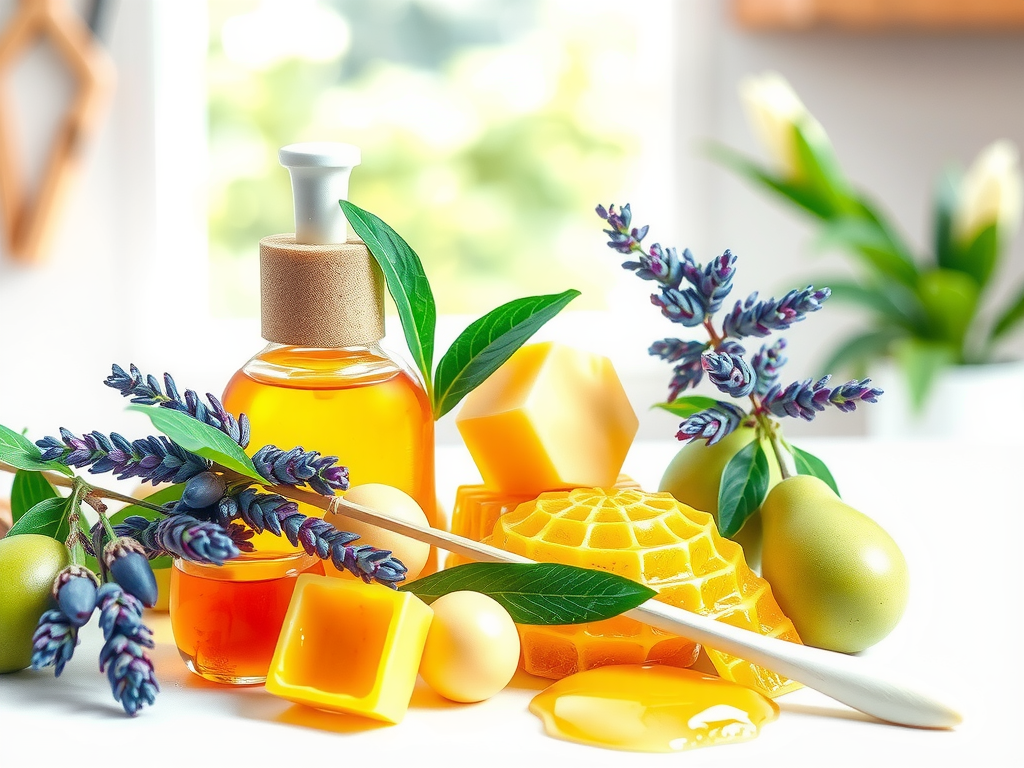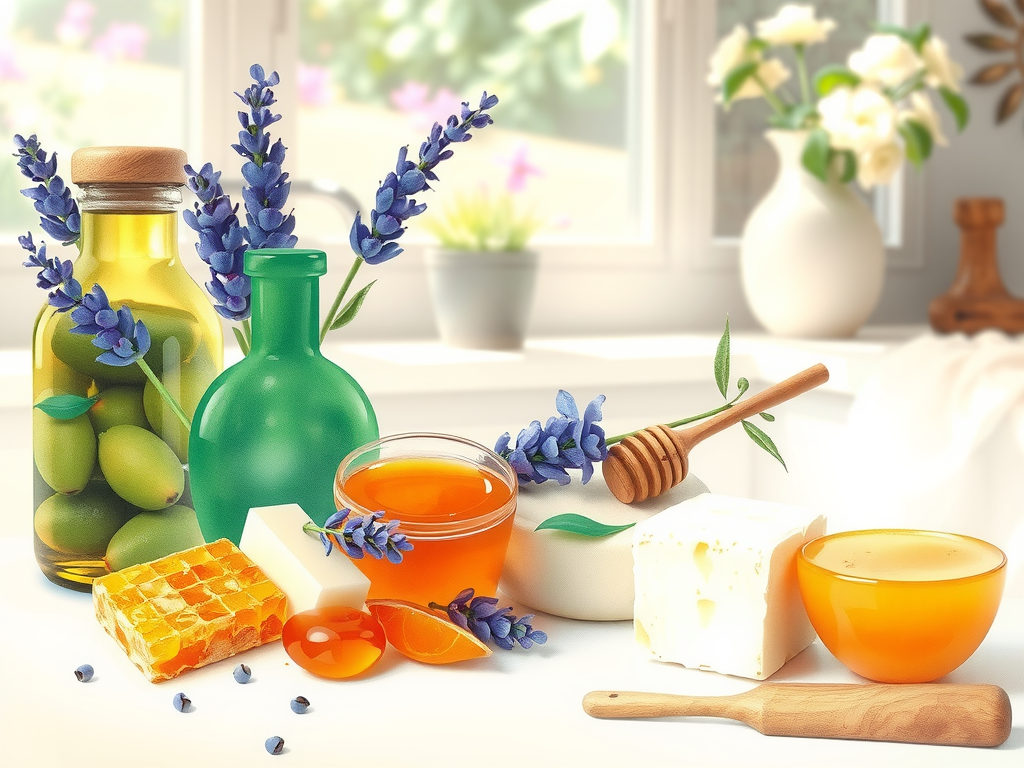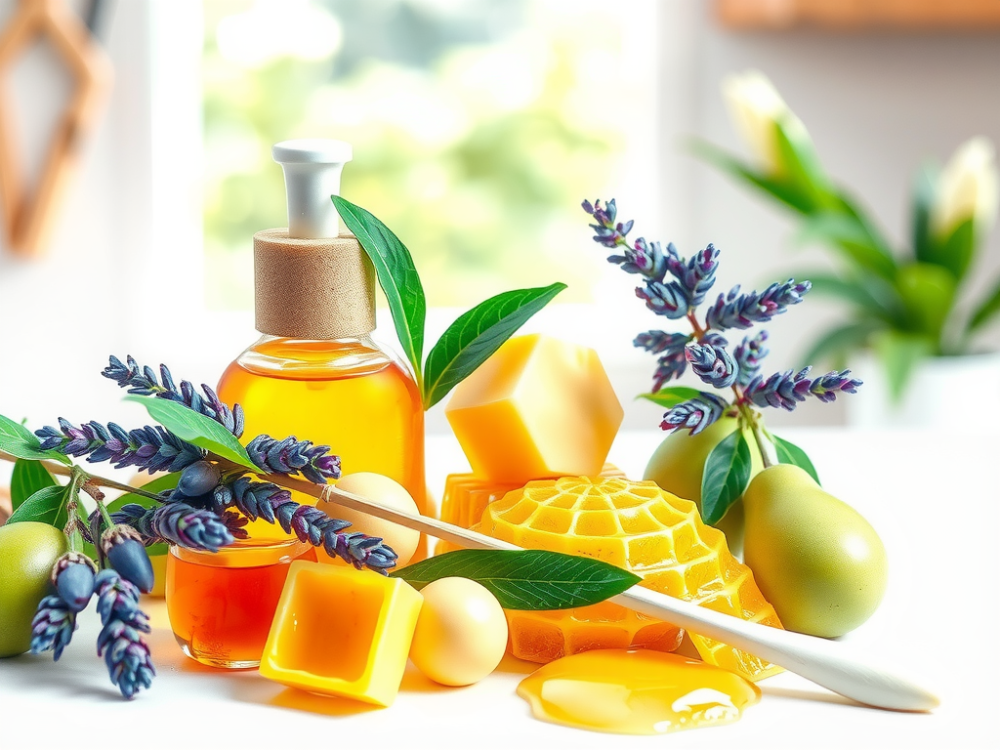
Natural soap uses simple, plant-based ingredients. These components are essential for nourishing the skin and avoiding harmful chemicals.
Popular ingredients include olive oil and coconut oil.
They support skin health and deliver hydration.
Each ingredient enhances overall wellness. By focusing on these natural elements, soaps promote better skin and a healthier lifestyle.
Specific ingredients greatly improve skin nourishment and encourage the use of natural products for effective skincare.
Click here to learn more about: how to make homemade soap at home
Key Ingredients in Natural Soaps
Natural soaps consist of various ingredients that provide benefits for skin health:
- Plant-Based Oils: Olive oil and coconut oil hydrate and enhance skin elasticity.
- Butters: Shea butter and cocoa butter moisturize deeply and soothe irritation.
- Essential Oils: Lavender and tea tree oil offer fragrance and antibacterial properties.
- Exfoliants: Oatmeal and seaweed detoxify and gently remove dead skin.
- Natural Colorants: Dyes from botanicals or clays enhance aesthetic appeal without harm.
- Saponified Components: Water, plant oils, and lye undergo saponification to create soap.

Understanding Organic Oils In Soap
Organic oils provide significant benefits in natural soap. For example, olive oil hydrates and improves skin elasticity. Coconut oil moisturizes and has antibacterial properties. High-quality oils enhance soap effectiveness and support overall skin health. Ethical sourcing ensures that these ingredients are safe and sustainable for users. Choosing high-quality organic oils allows consumers to make informed decisions about their skincare routines.
Benefits of Organic Oils
Organic oils contribute uniquely to skincare:
- Hydration: Oils like avocado and sweet almond oil help keep skin moist.
- Soothing Properties: Certain oils can reduce inflammation and irritation.
- Antibacterial Effects: Essential oils combat bacteria and promote clear skin.
Final Thoughts on Natural Ingredients
Natural soap ingredients create safe and effective products. By using plant-based oils and butters, consumers support sustainable beauty. They help ensure the environment benefits while providing gentle skincare solutions. The rich nutrients and gentle formulations found in these soaps make them suitable for all skin types.
What Are Plant Extracts Benefits
Plant extracts provide important benefits for skincare. Extracts come from natural sources, such as aloe vera, green tea, and chamomile.
These ingredients are rich in nutrients, helping to nourish and soothe the skin.
Many plant extracts have anti-inflammatory and antioxidant properties, improving skin health.
Research shows a significant 30% increase in moisture retention with certain herbal extracts. To use plant extracts, choose serums or creams that showcase these skinloving nutrients.
You can also add essential oils in your DIY skincare routines.
Advantages of Specific Plant Extracts
- Aloe Vera: Hydrates and calms irritated skin.
- Green Tea: Protects against free radicals and reduces inflammation.
- Chamomile: Soothes sensitive skin and promotes healing.
Incorporating these extracts into your routine can enhance your skincare results significantly.
The Role Of Hydrating Butters
Hydrating butters improve skin moisture retention effectively. Butters like shea and cocoa provide deep hydration and nourishment. These ingredients lock in moisture and help prevent dryness. Combining butters with plant extracts offers better hydration, making your skin supple. To select the right butter for your skin type, consider the following:
Choosing the Right Butter
- Shea Butter: Best for dry skin due to its rich texture.
- Cocoa Butter: Suitable for normal to oily skin for its balancing properties.
These moisturizing components are necessary to keep your skin healthy and hydrated.
Plant Extracts and Hydrating Butters
- Plant extracts like aloe vera and green tea are known for their high levels of antioxidants, which combat skin aging.
- Research indicates that aloe vera can increase skin hydration by up to 30%, making it a powerful ingredient in skincare.
- Shea butter is praised for its ability to deeply moisturize and is often recommended for individuals with dry skin conditions.
- Cocoa butter is recognized for its emollient properties, helping to balance oil production in normal to oily skin types.
How Glycerin Enhances Soap Quality
Glycerin serves as a natural humectant in soap. This means glycerin helps retain moisture in the skin, improving overall soap quality.
Moisture retention is critical for healthy skin.
It prevents dryness and irritation.
By drawing water from the environment, glycerin keeps your skin hydrated.
Using glycerin can enhance the luxurious feel of your soap.
For the best results, use glycerin in moderate amounts. Aim for around 5-10% of your formulation.
This balance prevents a sticky texture while maximizing skin-loving hydration. Incorporating glycerin boosts moisture and improves the soap’s luxurious feel.
Exploring Therapeutic Scents In Natural Soap
Therapeutic scents significantly enhance your well-being.
These scents offer psychological and physical benefits, such as improving mood and reducing stress.
Essential oils, like lavender and eucalyptus, provide pleasant aromas and soothing properties.
Effective scent blending can elevate your soap-making experience.
For successful scent blending, start with a base note like sandalwood to create depth.
Add middle notes like lavender. Finish with bright top notes such as lemon.
This combination results in a balanced aroma that complements the soap. Using organic oils ensures a safe and pleasurable experience.
- Glycerin is a natural humectant that helps retain skin moisture, preventing dryness and irritation.
- Incorporating glycerin in soap formulations can improve the overall luxurious feel and hydration benefits.
- Essential oils like lavender and eucalyptus not only provide pleasant aromas but also contribute to psychological well-being.
- Successful scent blending involves combining base, middle, and top notes for a balanced aroma that enhances the soap-making experience.
Benefits Of Essential Oils In Skincare
Essential oils offer significant therapeutic benefits that enhance skincare routines. Popular essential oils like lavender provide soothing properties, promoting relaxation while calming irritated skin.
Tea tree oil is known for its antibacterial effects, making it effective against acne.
Regular use of essential oils can reduce inflammation and improve skin tone.
When using essential oils, always dilute them with a carrier oil, like coconut butter, to ensure safety.
Combining these pure ingredients with natural soap ingredients enriches your skincare, making it more effective and enjoyable.
Popular Essential Oils and Their Benefits
Lavender oil helps with relaxation and has soothing properties. It is ideal for calming sensitive skin.
Tea tree oil combats bacteria, making it perfect for treating acne. Eucalyptus oil can clear skin and has antibacterial benefits.
Bergamot oil adds a refreshing scent while aiding in skin rejuvenation.
These therapeutic scents promote overall well-being and skin health.
Why Choose Cruelty-Free Ingredients
Choosing cruelty-free ingredients is about making ethical decisions in skincare.
Cruelty-free products ensure no harm comes to animals during testing, promoting compassion. Using these ingredients supports sustainable practices, aligning with organic oils and environmentally friendly sourcing.
To identify cruelty-free products, look for certifications like the Leaping Bunny logo.
Research brands to ensure transparency regarding their practices. By selecting cruelty-free products, consumers support an ethical beauty industry while enjoying the benefits of natural ingredients designed for skin nourishment.
Identifying Cruelty-Free Products
Look for brands that advertise their ethical sourcing practices.
Consumer awareness is essential for finding vegan-friendly and cruelty-free options.
Websites and apps can help identify products that meet cruelty-free standards.
This knowledge empowers buyers to choose products that align with their values.
Essential Oils and Cruelty-Free Ingredients
- Essential oils have been used for centuries in skincare for their natural healing properties.
- Studies show that lavender oil can reduce anxiety levels and improve skin conditions like eczema.
- Tea tree oil is clinically proven to reduce acne lesions and has potent antibacterial properties.
- The global demand for cruelty-free products is increasing, with consumers prioritizing ethical sourcing and sustainability.
The Importance Of Sustainable Formulations
Sustainable formulations make a big difference in soap making. They help reduce environmental impact and pollution.
Choosing organic oils and natural colorants promotes cleaner ecosystems.
Sustainable methods cut waste, leading to positive changes for our planet.
Consumer interest in cruelty-free and eco-conscious products grows every year.
Using biodegradable materials, such as plant-based oils and hydrating butters, supports this demand. Makers using pure ingredients create effective soaps that nourish the skin.
This approach ensures safety for consumers and health for the environment. Shifting to sustainable formulations is essential for a healthier future.
Overview of Natural Soap Ingredients
Natural soaps rely on plant-based oils, butters, essential oils, and organic additives.
These ingredients nourish and protect the skin while avoiding harmful synthetic chemicals.
They promote sustainability and skin compatibility.
Plant-Based Oils such as olive oil, coconut oil, and avocado oil enhance skin hydration and elasticity.
These oils are common in many handmade soap recipes. Butters like shea butter and cocoa butter provide deep moisture and soothe irritation, promoting skin health.
Essential Oils like lavender and tea tree add fragrance and offer antibacterial benefits.
Exfoliants such as oatmeal and powdered clays gently detoxify and remove dead skin. Natural Colorants, derived from botanicals and clays, add visual appeal while being kind to the skin.
The soap-making process involves saponified components like water, plant oils, and lye.
During saponification, these ingredients combine to form soap that cleans and nourishes.
Natural soaps are gentler and more nourishing than conventional options.
They meet the needs of all skin types, including sensitive skin.
Glycerin, a by-product of saponification, helps retain moisture, preventing dryness.
Choosing therapeutic scents, such as essential oils, provides added benefits. These scents can reduce inflammation and combat bacteria.
Natural exfoliants effectively cleanse pores while being gentle on the skin. Sustainable formulations use environmentally friendly and biodegradable ingredients, promoting green living.
Using a cold-process method leads to preservative-free and chemical-free soaps.
These soaps support hydration and overall skin health.
Minimalist ingredients enhance consumer trust, allowing them to understand exactly what they are using.
| Ingredient Type | Benefits |
|---|---|
| Plant-Based Oils | Enhance skin hydration and elasticity |
| Butters | Provide deep moisture and soothe irritation |
| Essential Oils | Add fragrance and offer antibacterial benefits |
| Natural Colorants | Add visual appeal while being kind to the skin |





